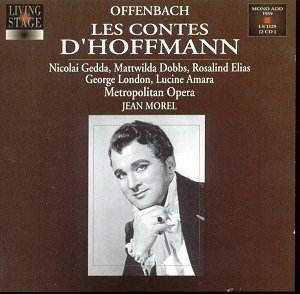Another splendid night live at the Met’s
French Wing enshrines a 1959 performance
from Gedda that will do very nicely
indeed as ancillary documentation of
his Hoffmann, a role he was famously
to record. On the night of February
7th 1959 he was on regal
form and his is the dominating presence
in a very well and richly cast performance
presided over by the estimable, indeed
thoroughly impressive specialist Jean
Morel, who was brought in to cover just
such repertoire following the lacuna
left by the departure earlier of such
stalwarts as Beecham and Monteux.
The edition is the
Choudens, which therefore includes an
aria for George London’s Dapertutto
that has gravitated from another Offenbach
work. But the textual problems are minimal,
the musical rewards here maximal. The
sound is immediate and good though it
has a kind of omnipresent low-level
rumble – like an indifferently transferred
disc that has enshrined LP rumble –
and this can prove rather tiring for
the ear. Morel though was on captivating
form in the pit, proving effervescent
and galvanizing in equal measure. Here,
one feels, is a conductor with just
the right touch, a rapier dipped in
champagne, for this of all works. He
clearly inherited the mantle of his
two distinguished predecessors with
due honour and he shows how sheerly
dynamic and propulsive this music is
when conducted with such freshness,
rhythmic acuity and drive. He also marshals
the chorus with discipline and fine
attack.
If we note the highlights
then one can point to George London’s
assumption of what the cast list calls
The Four Villains. His Lindorf is etched
with villainy though nowhere in his
impersonations does London reach for
the ham; this is controlled and masterly
actor-singing, with nuances conveyed
with subtlety. His Act II Coppelius
sounds almost censoriously and sententiously
grave and his Dr Miracle proves powerful
and authoritative with considerable
reserves of weight. Hoffmann’s Click-Clack
introduces us to Gedda’s superby focused
tone – there’s nothing of the metallic
here – as well as his eloquent legato,
sappy consonants, the "s"
and "t" both gloriously brusque
and witty, and his personality-rich
musicianship. Don’t overlook the First
and Second Act choruses either; Drig,
drig, drig is unusually well disciplined
this early in a production, and the
vivacious rhythms of the finale of the
first act are propulsive indeed. The
orchestra is on as good form as their
choral colleagues, shining in the Entr’acte
that begins Act II where Paul Franke
proves an excellent Spalanzani.
As Olympia we hear
Mattiwilda Dobbs whose finely pitched,
rather open, girlish sound possesses
a curiously involving sense of self.
Her trills are not quite electric enough
but they certainly pass muster. Another
less well-known singer, Rosalind Elias,
takes the part of Giulietta and she
does so with distinction. She has a
powerful voice though one deployed with
flexibility across the range. Her exchanges
with Gedda’s Hoffmann in Act III’s Aujourd’hui,
cepedant possess urgency and trenchant
rhythmic impetus; they’re also exciting
dramatically, which is the paradigm
of a convincing theatrical assumption.
Lucine Amara is good as Antonia, warm
certainly if not quite up to Elias’s
standard.
Try to listen to the
orchestral principals as well. Listen
for instance to the excellent wind solos
in Hoffmann’s Act IV Frantz! C’est
ici! and to the equally involving
string cantilena – though to be parsimonious
one should also note that the recorded
balance has them rather distantly placed
in the aural perspective. The principal
clarinet shows his colours in Ne
plus chanter!
So whilst Gedda is
the star this is a real ensemble success,
presided over by a knowledgeable and
excellent operatic conductor. You might
want to augment your commercial Gedda
with it. But you’ll need to do some
digging about with regard to cast lists
and supporting documentation. The former
here is incomplete and there are no
notes, as is usual from this company,
one of a number who issue recordings
of this kind in this way. Only the six
principal cast members have been listed
so I’ve added the full cast as I believe
them to have been on that February day.
The dilemma is that in indulging companies
such as this by buying their product,
so lazily presented, you might be reducing
the likelihood that a more responsible
outfit might present this set with full
supporting information, biographies,
cast lists and the like. That’s the
market place for you.
Jonathan Woolf


